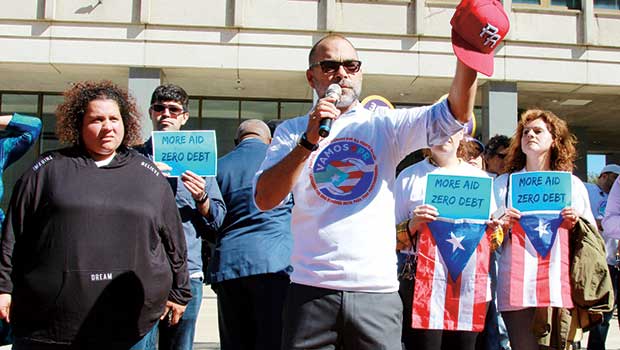Puerto Rico’s growing emergency
Hurricanes exacerbate financial crisis

The devastation of two hurricanes has put the human costs of Puerto Rico’s debt repayments in sharper focus. The U.S. territory owed more than $70 billion before Hurricanes Irma and Maria struck, knocking out most of the already-outdated electric grid, flooding streets, demolishing homes and causing massive shortages of basic supplies. On Sept. 30, the Department of Defense estimated that 45 percent of Puerto Rico residents were without access to drinking water and 95 percent without power.
Fixing the damages caused by Maria alone, which had more severe impact than Irma, is estimated to cost $95 billion to a government already unable to pay its $70 billion debt. As the government strives to stay afloat and fund recovery efforts, it does so while revenue has been cut off due to the emergency. Puerto Rico Treasury Secretary Raul Maldonado told Bloomberg News on Oct. 4 that it will be at least another month before the government resumes collecting taxes.
“Essentially you’re looking at zero revenue for the next couple of months,” said Maldonado. “While you have zero revenue, you still have expenditures, plus emergency expenditures. That means the money is going to run out very quickly.”
Even when tax collection resumes, that revenue may be severely depleted, as the hurricane has accelerated an ongoing exodus of residents driven out by the island’s buckling economy and lack of jobs. Between 2010 and 2016, the population declined by 8 percent, according to MarketWatch. In the hurricane’s aftermath, it is likely another 100,000 to 200,000 residents will leave, Edwin Meléndez from Center for Puerto Rican Studies at Hunter College told Vox.
Maldonado has asked the federal government to provide $6 billion to $8 billion to keep the territory’s government running for the next few months. Without emergency funding from Congress, Puerto Rico’s government may shut down on Oct. 31, he said.
The creditors
Puerto Rico’s creditors range from individual retirees to deep-pocketed hedge fund owners. After the hurricanes struck, The Intercept contacted 51 major bondholders to ask if they would support a cancellation or moratorium on debt payments. By Sept. 27, none of the 51 creditors contacted said they supported debt relief, and only three reported donations to relief organizations: Goldman Sachs, Citibank and Scotiabank. Others, including the Prepa Bondholder Group, offered a new loan and a loan swap. The offer would provide immediate cash for restoring power, but would have to be repaid with interest, piling more onto the debt burden. The bonds offered also are of a type that have a higher repayment priority than currently held by that creditor group, thus placing them ahead in the line to get paid, The Intercept states.
Boston connection
Bostonians are among notable players in Puerto Rico’s financial crisis. Recently, it was revealed that Seth Klarman’s Boston-based Baupost Group hedge fund owns $911 million of Puerto Rico’s debt. Another local is Carlos Garcia, owner of BayBoston and a member of the Hyde Square Task Force board of directors, who was involved in issuing debt on behalf of Puerto Rico, tightly linked to a company paid to underwrite the debt and on the board charged now with resolving the crisis.
Garcia became head of Puerto Rico’s Government Development Bank in 2009. While there, he issued COFINA bonds, which are backed by sales taxes and thus draw from funds that otherwise would support public services. One of the banks that received steep fees for underwriting those bonds was Santander, where Garcia had been an executive and to which he returned after his government role, according to a report from the Hedge Clippers and Committee for Better Banks. Report authors questioned the financial logic behind many of the COFINA bonds issued, and charged that Garcia profited off exacerbating the financial crisis.
Garcia was appointed to the Financial Oversight and Management Board, which is charged with restructuring Puerto Rico’s finances to address the debt crisis. Meanwhile, Garcia also chairs the Caribbean Financial Group, which offers small, personal loans aimed at individuals with little access to credit from traditional lenders. The group’s loans have interest rates listed as high as 25 percent over four years, according to the Hedge Clippers-Better Banks report. That report states that such loans seem designed to extract profit from those with few alternatives, such as Puerto Ricans in the midst of the debt crises. Protestors demonstrated in Newton, Massachusetts in March, calling for Garcia to step down from the board.
The White House
President Donald Trump shook the finance industry when he said in an interview that aired on Fox News on Oct. 3 that Puerto Rico’s debt would be cleared. Following his comments, White House officials quickly backtracked, saying the president should not be taken literally.
“You know they owe a lot of money to your friends on Wall Street. We’re going to have to wipe that out,” Trump said on CNN. “You can say goodbye to that, I don’t know if it’s Goldman Sachs, but whoever it is, you can wave goodbye to that.”
The value of Puerto Rico’s general obligation bonds dropped after these comments, and White House budget chief Mick Mulvaney downplayed the comments on CNN.
“I think what you saw the president talking about was his acknowledgment that Puerto Rico is going to have to figure out a way to solve that debt problem in order to fix itself going forward,” Mulvaney said. “Puerto Rico is going to have to figure out how to fix the errors that it’s made for the last generation on its own finances.”
He told Bloomberg that the administration would not pay off Puerto Rico’s debt, but is preparing a rebuild and repair plan.
Critics have said the government is moving too slowly to rescue its citizens in Puerto Rico. According to figures provided to Vox on Oct. 3 by a spokesperson, FEMA had approved $691 million in grants to Florida to recover from Irma but only $35 million to Puerto Rico.






